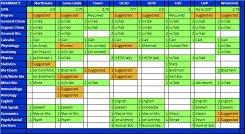We took our seats and pretty much right on time, we were welcomed by Peter Dean, the Recruitement Coordinator. He handled all the transitions and introduced us to Dr. Mel Baron, PharmD., MPA, the Assistant Dean for Programmatic Advancement and Associate Professor of Clinical Pharmacy and Pharmaceutical Economics & Policy (phew!)
He has been a pharmacist for 52 years. He graduated from USC, back when there was no such thing as a cell phone or a computer. And he wanted to talk to us about how to profession is looking today. He wanted to make sure that we all understood that the profession of pharmacy isn't contained in a small "pharmacist box" that many people seem to believe it is.
When he graduated, the chain pharmacy did not exist. It was all community and local pharmacies, and of course hospital pharmacies. When he graduated, he opened up his own pharmacy in a medical building, and did that for a long period of time. Towards the end, they began to (not? I think I left out a "not" in my notes) just fill out prescriptions. They focused on spinal cord injuries, incontinent patients, iliostemy and cholostomy surgery, he had nurses on staff, IV and chemo hoods, and even sold drugs wholesale.
Eventually he sold his company to a Fortune 500 company. He worked for that corporation for four years. Eventually he didn't want to do that anymore, and he didn't want to retire, so he considered teaching. He began as a part time teacher in 1980, then full time in 1990. He currently teaches 1st year students.
What kinds of things does he do now besides teaching students? For over 10 years he had been interested in health literacy. To really take a look at how we really inform patients about medicines, and management, etc. A lot of info is poorly written. And here in California (especially southern California), there is a heavily Hispanic population. So a lot of his projects have focused on low income, low literacy Hispanics.
[Note: I'm not sure what I meant in my notes about this next part - Team safety net clinics. Provide care for uninsured, homeless, minimally insured. - Not quite sure what a "safety net clinic" is.]
Many pharmacists here work as a team. And focus on providing care and helping their patients manage what they're taking. Part of that population has difficulty in understanding their medications. So I (we) created photo novellas. (He holds up several samples of these photo novellas. They look like they have nothing to do with drugs/medications, and just look like what you'd expect on the cover of some daytime drama. Usually a man and woman dressed up in fancy evening wear, looking intimately at each other.)
They're pretty much a soap opera, but they deliver a health message. "Oscar and the Giant" is about pediatric asthma. He holds up another one titled "Sweet Temptations" and asks what we think that one is about. Someone yells out sex as the answer. He says, "No. Diabetes." We laugh. "Fiesta Fiasco" is about the appropriate use of medication.
He took the idea even further and had a meeting with the National Institute for Transplantation, and not only created (will create?) a novella for them, but they are working on a series of ten 3 to 5 minute videos to help explain what is going on.
He wanted to tell us all that to give us an example of the other kinds of things that pharmacists can do. He also does consulting. He consults with community clinics, hospitals, and lawfirms about malpractice issues.
Then after his introduction, the student pharmacist with him introduced himself. He knew he wanted to own his own pharmacy, and while he was confident before even starting the program, he assured us that after you are finished (he's a 4th year), you'll know that USC's program did an excellent job is preparing you for what's out there.
And that's pretty much it for the introduction. He left us off with a speech about, if you're a great person, you'll get hired. Just make sure you strive to be great, and work hard, and don't just try to be mediocre, and it'll pay off.
Next: Admissions
Next: Admissions





No comments:
Post a Comment